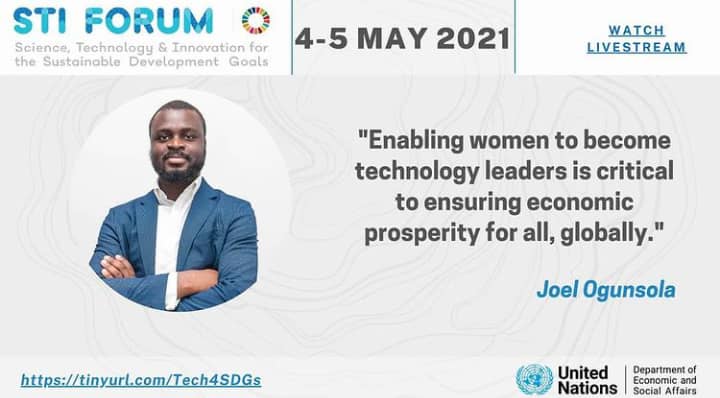 Back
Back
The Women Techsters Initiative; A Solution Advancing Science, Technology and Innovation.
| June 3, 2021

According to a 2020 UN Report, The COVID-19 pandemic has created the most significant disruption of education systems in history, affecting nearly 1.6 billion learners in more than 190 countries and all continents. This was one of the themes discussed at the Science Technology and Innovation (STI) Forum. The STI Forum is a global information platform focused on science, technology and innovation for Sustainable Development Goals. Over the years, this platform has become a dedicated virtual open source for knowledge sharing and dissemination of information in terms of research and innovation.
In 2020, the Women Techsters initiative was recognized as an innovative solution globally advancing science, technology, and innovation. Tech4Dev was invited to share the objectives of the Women Techsters Initiative on the Education Innovations Panel at the 6th annual STI for the Sustainable Development Goals Forum.
Representing Tech4Dev, was Joel Ogunsola, Co-Founder & Director of Partnerships and Sustainability at Tech4Dev. Other innovators in attendance were Charles Agbemashior, Founder and Director of We Go Innovate; Felipe Prado, Program Director and Co-Founder at Swarmob and Paul Falzone, Executive Director Peripheral Vision International. Lea Simpson, Co-Founder of Innovation Practice at Blink and the Innovation Director for the Global Ed Tech Hub, moderated the session
In her introduction, Lea spoke on the state of the education sector, drawing from the Global Education Report. In her words, “According to the Global Education Monitoring Report, 2015, it would take 70 years under business as usual to achieve Universal Primary education for girls; including those who are marginalized or otherwise disadvantaged”. She spoke about how the Covid 19 pandemic and other recent happenings have disrupted the Education sector and have made it twice as hard to educate girls and young women. Still speaking, Lea mentioned that “Innovation is highly required if we are going to make a headway towards SDG 4 (Quality Education)”.
The session later evolved into an interactive one, where innovators spoke about their impact. Joel Ogunsola shared some insights on Tech4Dev as an organization and the Women Techsters initiative. He said, “Tech4Dev is a non-profit focused on driving economic growth for young Africans through digital skills advocacy and empowerment. Our initiative is called the Women Techsters Initiative. Over the last five years, my colleagues at Tech4Dev and I have consistently worked on building digital skills skilling initiatives. The problem we sought to solve was creating opportunities for young Nigerians and Africans to access decent work engagement through access to the internet and digital learning infrastructures. But what we then found out was, there was a huge gender gap. In the best-case scenarios, we would have 8 men to 2 women within any digital skills program. Then we decided to create Nigerian Women Techsters supported by Microsoft, and the objective was to train 2400 women and girls across Nigeria in Digital skills. We realized that after two years of running this program, and also in alignment with already available statistics that investing in women gives the community 3 times the return on that investment. We decided to upscale our goal to a more ambitious goal of reaching 5 million women across Africa by 2030. This goal was unveiled at the UN Solution Summit, which we were a part of in 2019.”
Tech4Dev as an organization has come a long way; however, as an organization dedicated to empowering women with Digital skills, some challenges are currently being faced. When asked what our biggest challenge was, Joel said, “One of the biggest challenges we’ve seen with girls and women accessing these skilling opportunities is Infrastructures. That is access to devices and, in a lot of cases, affordable internet connectivity. So, we are happy to receive technical partnerships in terms of existing learning infrastructures within the various countries that we can use to drive increased access further. Also, it would be nice to get funding to pay for subsidized internet connectivity for our Fellows.”
Joel rounded up by speaking on the strategic ways the initiative intends to enable more women to become tech leaders. He said, “At the end of the day for us, what success means is providing easy access to jobs and opportunities for everyone”.
It was eye-opening listening to other innovators who are using technology to advance education on the continent. You can watch a replay of the conversation here Panel 3, STI Forum